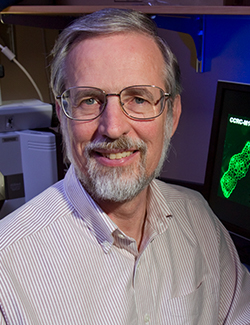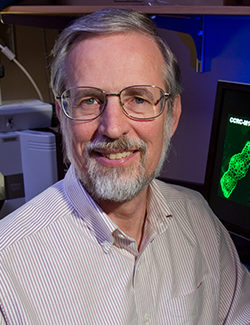Michael G Hahn


Short Biography:
Dr. Hahn received a B.S. in chemistry and a B.A. in Independent Studies in 1974 from the University of Oregon and his Ph.D. in biochemistry in 1981 from the University of Colorado. A postdoctoral research associate appointment at the University of Wisconsin-Madison in plant pathology followed, after which Dr. Hahn went to the Albert-Ludwigs-Universiät (Freiburg, Germany) with the support of an Alexander-von-Humboldt stipend. Following another postdoctoral research associate appointment at the Salk Institute (San Diego, CA), Dr. Hahn joined the CCRC in July 1986. Full publications: 77.
Research Interests:
Our laboratory studies the cell biology and biosynthesis of plant cell walls. Plant cell walls play major roles in the biology of plants. Examples of these roles include controlling the growth and shape of plant cells, tissues, organs, and ultimately the entire plant, regulating the movement of nutrients and signals within the apoplast and toward the plasma membrane, serving as the first line of defense against pathogens and environmental stresses, and acting as a source of signaling molecules important in plant development and defense. Plant cell walls are also the principal component of plant biomass, which has become a focal point in the search for alternative and renewable sources of energy (biofuels).
We are pursuing two broad research goals:
(A) We are investigating plant cell wall biosynthesis by looking at two families of genes, primarily in Arabidopsis, thought to encode glycosyltransferases involved in plant cell wall glycan biosynthesis: 1) GAlacturonosylTransferase-Like (GATL) proteins thought to be involved in pectin biosynthesis; 2) FUcosylTransferase (FUT) proteins thought to add fucosyl residues to diverse plant cell wall glycans.
(B) We have developed a large and diverse library of monoclonal antibodies against plant cell wall glycans. These antibodies are being used to determine the locations of diverse cell wall carbohydrate structures (epitopes) in Arabidopsis, switchgrass and poplar. These antibodies are also proving useful for plant cell wall mutant characterization studies, and for quantitating glycans in cell wall extracts.
Our laboratory utilizes a broad range of experimental approaches in these studies, including molecular genetic, biochemical, immunological and microscopic techniques.
